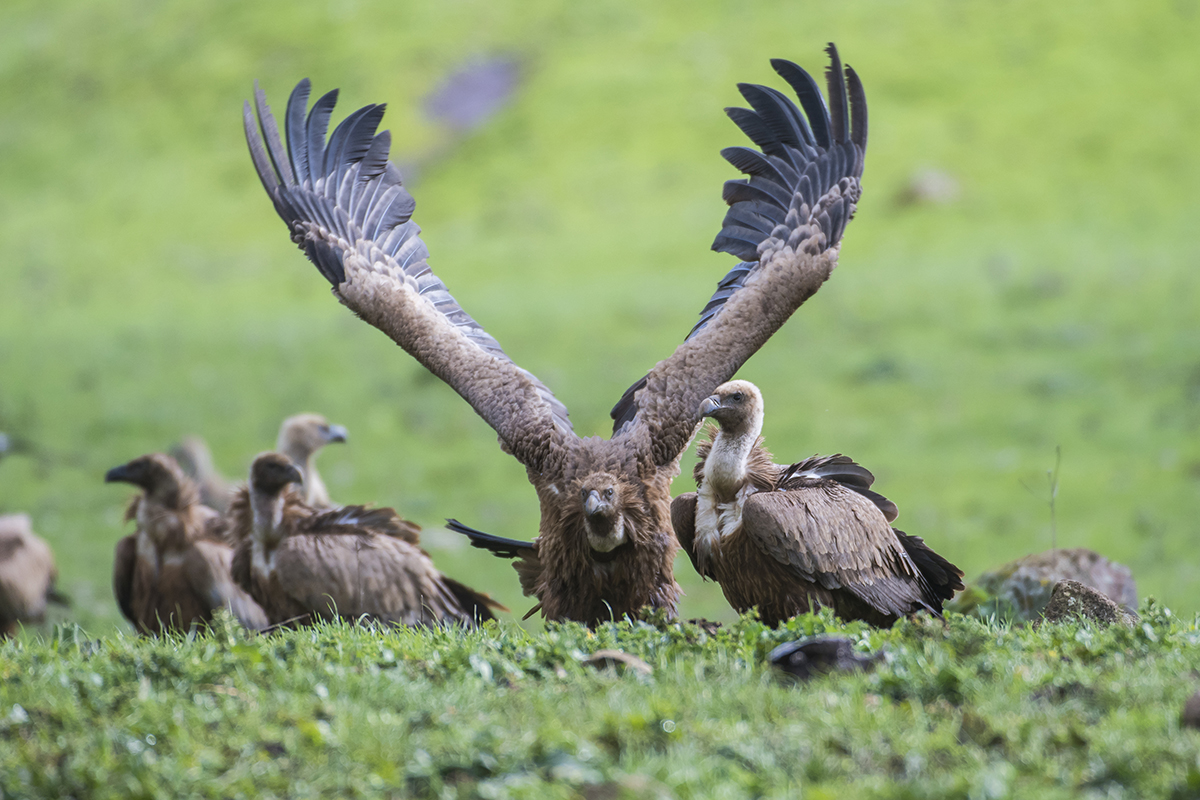
An ambitious project implements concrete conservation actions to rewild the Côa Valley in Portugal, which acts as an important natural corridor for wildlife. An essential element of the project is the restoration of trophic chains – how does tracking the movements of Griffon Vultures help achieve this goal?
Rewilding the Côa Valley

The Greater Côa Valley is an area in Northeastern Portugal, close to the border with Spain, with rich biodiversity and varied landscapes. The river gorges, oak forests, rocky heathlands and scattered fields constitute a spectacular mix between the Douro river and the Malcata mountain ranges. Last year, the project “Scaling Up Rewilding in Western Iberia” started in this area, with the goal of developing a coherent ecosystem and strengthening the wildlife corridor of the Côa Valley. An essential element of rewilding this valley is the restoration of trophic chains. At the moment, local populations of Griffon Vulture (Gyps fulvus), Egyptian Vulture (Neophron percnopterus) and Cinereous Vulture (Aegypius monachus) are affected by low availability of food sources in the region, an issue which so far has only been mitigated by a network of artificial feeding stations (so-called “vulture restaurants”).
Promoting the restoration of tropic chains
One of the aims of the project is to increase the availability of carrion in the area by setting up a network of local farmers who are allowed to leave the carcasses of livestock (sheep, goats, pigs, horses or donkeys) on designated areas of their properties, something which so far has not been done in Portugal. In order to set up this network to improve the availability of carcasses in a more natural way – more diverse in terms of location and time – and also to be able to evaluate the success of this measure, it is important to know how scavenger birds from the colonies of the Côa Valley and the Douro International Natural Park are currently using the landscape and the available feeding resources.
Understanding feeding ecology with GPS tracking

To that end, Griffon Vultures, as the most abundant and widespread of the three vulture species, are being tagged with GPS transmitters in the Côa Valley, and their movements are being monitored. This is providing critical information about the resources that Griffon Vultures use for feeding and where they feed. Understanding the feeding ecology of the scavengers in the region will provide valuable information regarding priority areas where food availability should be improved. Moreover, in four years’ time it will be possible to check how the situation has changed regarding the way in which Griffon Vultures use the landscape and feed.
Competition: Win a GPS tag

Ecotone Telemetry generously donated a GPS tag to the Vulture Conservation Foundation (VCF), and the VCF decided to donate it to help support the monitoring and conservation actions of another Griffon Vulture or Cinereous Vulture project in Europe. In early 2020, we carried out the competition together, and we are happy to announce that Rewilding Portugal is the winner! Their project, Scaling Up Rewilding in Western Iberia, will now be able to tag one more Griffon Vulture in the Côa Valley, which will provide valuable additional data. This new transmitter will be used in May of this year, when the next group of Griffon Vultures will be tagged. We will communicate in the future about the vulture that will be tagged and its movements. You can stay tuned on the updates by signing up to our newsletter.
Scaling Up Rewilding in Western Iberia
The “Scaling Up Rewilding in Western Iberia” project is financed by the Endangered Landscapes Programme, which is managed by the Cambridge Conservation Initiative and funded by Arcadia, a charitable fund of Peter Baldwin and Lisbet Rausing. The project is being coordinated by Rewilding Europe, in partnership with Rewilding Portugal, the University of Aveiro, Associação Transumância e Natureza and Zoo Logical. Sponsored by Mossy Earth, the tagging of the griffon vultures was carried out by Associação Transumância e Natureza, together with members of the Rewilding Portugal team. As scientific collaborators, CIBIO-InBIO and Movetech provided the transmitters and are also supporting with data analysis and the dissemination of results.
Ecotone Telemetry
Ecotone Telemetry is an association of professional ornithologists, ecologists and specialists in environmental protection. They put together projects and analyses in the field of environmental protection and management. They produce various kinds of GPS telemetry equipment for birds and mammals. Their wildlife trackers are used on all continents including Antarctica.
Sign up to our newsletter and never miss any vulture news!










